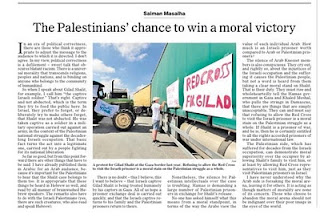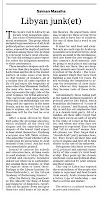Lev Grinberg: "Instead of bringing about the secularization of Judaism, Zionism turned religion into the central element of the definition of national identity, and turned the State of Israel into a tool of the religious redemption project.".....
Just like the story about the late Israeli politician Moshe Sneh, who raised the tone of his voice because his arguments were not persuasive, Professor Shlomo Avineri raises the tone in his reply to Salman Masalha, both of whose opinion pieces appeared on these pages earlier this month, and paints him as a racist. But Masalha did not claim that there is no Jewish people or that Jews do not have the right to self-determination. His argument is simple: If the state is defined by religion, it cannot treat all its citizens equally, as required of a democratic system of government.
Its true that from its inception, Zionism intended to turn the Jewish people from a religious community into a modern nation, but Avineri ignores the regrettable fact that the project of secularizing the Jewish people has failed. Israel has no legal definition for Judaism other than the religious definition, it does not recognize an Israeli national identity defined on the basis of citizenship, and it does not recognize a Hebrew nationality that is culturally defined.
The comparison to other countries where religion and nationality are linked is irrelevant, because those countries have a secular definition of the state and citizenship. You can be a Polish Jew or an Egyptian Jew, but you can't be a Jewish Muslim or a Jewish Christian.
In the attempt to make the Jewish people a nation like all others, Zionism strove to unite it through one language and concentrate it in one territory. There were arguments and struggles over this, and they were decided in favor of preserving the centrality of religion in the definition of the national collective. Instead of picking one of the languages that Jews spoke day in and day out, Hebrew, the holy tongue, was chosen.
Regarding territory as well, absolute secularists did indeed think that Jews could be settled in Uganda or Argentina, but the gravitational pull of the Land of Israel was decisive. The Bible was transformed from a religious text into Zionism's title deed, the justification for the demand for ownership of the territory. In other words, instead of bringing about the secularization of Judaism, Zionism turned religion into the central element of the definition of national identity, and turned the State of Israel into a tool of the religious redemption project, especially after the capture and settlement of biblical areas since 1967.
Defining the State of Israel solely as democratic and revoking the special privileges of Jews does not contradict Zionism, and certainly not Judaism. The connection to Judaism will remain in the calendar and the Hebrew language, in the name of the state and in the Jewish majority (if we manage to free ourselves from our rule over the Palestinians in the territories).
Democracy is based on universalist Jewish values, such as "Thou shalt love thy neighbour as thyself" and "Ye shall have one statute, both for the stranger, and for him that is born in the land." That requires separation of religion and state, something that will be good for both. Because in the current situation, not only does religion corrupt the state, but the state corrupts religion and pushes it toward nationalistic extremism.
Why isn't Israel a modern, democratic nation-state? I suspect that the secular Jews are not ready to relinquish the special privileges that the Jewish state grants them. With no other definition for Judaism, they are ready to accept the yoke of the religious establishment and give up democracy and equality. In my view, that is the meaning of the continued impossible defense of a Jewish and democratic state.
Woe to such Zionism: conservative and complacent, lacking imagination and vision. After such a bitter failure, we should start thinking of tikkun, of repair. Tikkun is a kosher concept; it's both Jewish and democratic.
*
Published: Opinion - Haaretz, August 23, 2010
See:
Salman Masalha, "A Jewish and democratic restaurant"
Shlomo Avineri, "A Palestinian people, yes, a Jewish people, no?"
Alexander Yakobson, "What's in the name?"
>Uri Avnery, "Poisonous Mushrooms"
***
Lev Grinberg
You can't be a Jewish Muslim
You can't be a Jewish Muslim
Just like the story about the late Israeli politician Moshe Sneh, who raised the tone of his voice because his arguments were not persuasive, Professor Shlomo Avineri raises the tone in his reply to Salman Masalha, both of whose opinion pieces appeared on these pages earlier this month, and paints him as a racist. But Masalha did not claim that there is no Jewish people or that Jews do not have the right to self-determination. His argument is simple: If the state is defined by religion, it cannot treat all its citizens equally, as required of a democratic system of government.
Its true that from its inception, Zionism intended to turn the Jewish people from a religious community into a modern nation, but Avineri ignores the regrettable fact that the project of secularizing the Jewish people has failed. Israel has no legal definition for Judaism other than the religious definition, it does not recognize an Israeli national identity defined on the basis of citizenship, and it does not recognize a Hebrew nationality that is culturally defined.
The comparison to other countries where religion and nationality are linked is irrelevant, because those countries have a secular definition of the state and citizenship. You can be a Polish Jew or an Egyptian Jew, but you can't be a Jewish Muslim or a Jewish Christian.
In the attempt to make the Jewish people a nation like all others, Zionism strove to unite it through one language and concentrate it in one territory. There were arguments and struggles over this, and they were decided in favor of preserving the centrality of religion in the definition of the national collective. Instead of picking one of the languages that Jews spoke day in and day out, Hebrew, the holy tongue, was chosen.
Regarding territory as well, absolute secularists did indeed think that Jews could be settled in Uganda or Argentina, but the gravitational pull of the Land of Israel was decisive. The Bible was transformed from a religious text into Zionism's title deed, the justification for the demand for ownership of the territory. In other words, instead of bringing about the secularization of Judaism, Zionism turned religion into the central element of the definition of national identity, and turned the State of Israel into a tool of the religious redemption project, especially after the capture and settlement of biblical areas since 1967.
Defining the State of Israel solely as democratic and revoking the special privileges of Jews does not contradict Zionism, and certainly not Judaism. The connection to Judaism will remain in the calendar and the Hebrew language, in the name of the state and in the Jewish majority (if we manage to free ourselves from our rule over the Palestinians in the territories).
Democracy is based on universalist Jewish values, such as "Thou shalt love thy neighbour as thyself" and "Ye shall have one statute, both for the stranger, and for him that is born in the land." That requires separation of religion and state, something that will be good for both. Because in the current situation, not only does religion corrupt the state, but the state corrupts religion and pushes it toward nationalistic extremism.
Why isn't Israel a modern, democratic nation-state? I suspect that the secular Jews are not ready to relinquish the special privileges that the Jewish state grants them. With no other definition for Judaism, they are ready to accept the yoke of the religious establishment and give up democracy and equality. In my view, that is the meaning of the continued impossible defense of a Jewish and democratic state.
Woe to such Zionism: conservative and complacent, lacking imagination and vision. After such a bitter failure, we should start thinking of tikkun, of repair. Tikkun is a kosher concept; it's both Jewish and democratic.
*
Published: Opinion - Haaretz, August 23, 2010
***
For Hebrew, press here
For Hebrew, press here
***
See:
Salman Masalha, "A Jewish and democratic restaurant"
Shlomo Avineri, "A Palestinian people, yes, a Jewish people, no?"
Alexander Yakobson, "What's in the name?"
>Uri Avnery, "Poisonous Mushrooms"
***




 Salman Masalha
Salman Masalha









